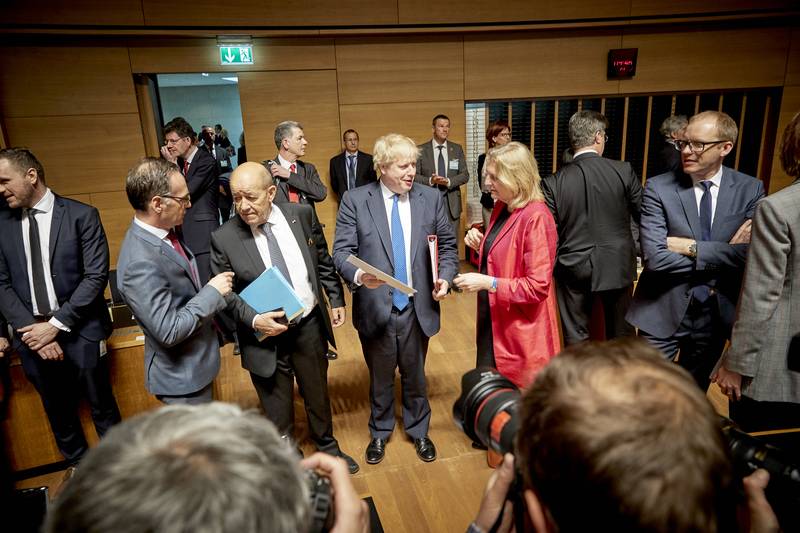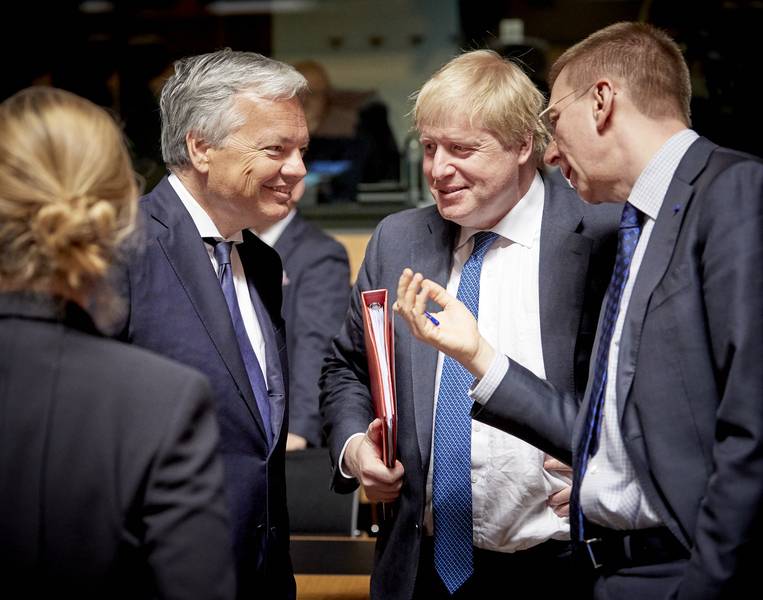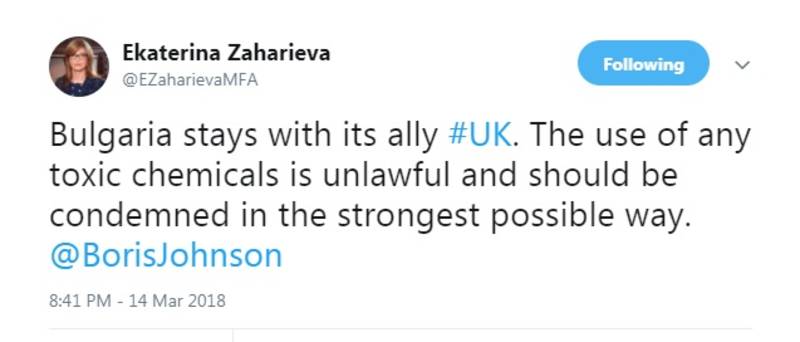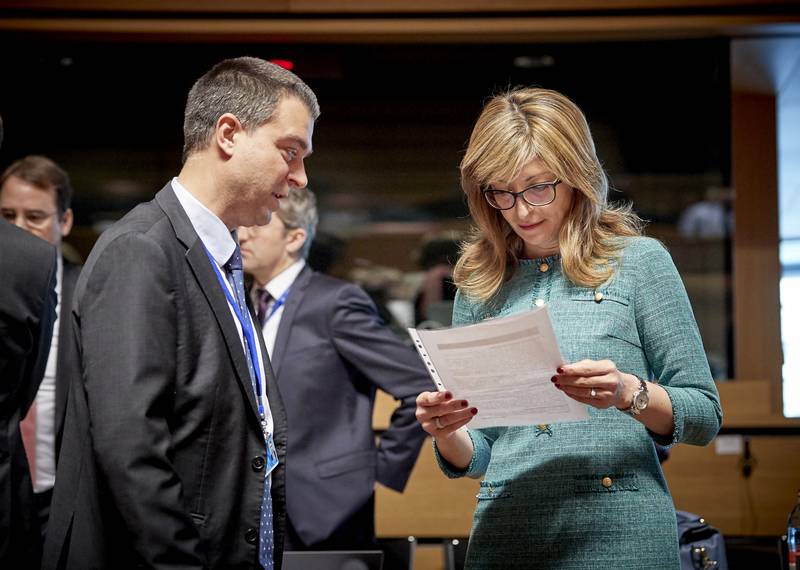Mogherini: Syria Is Farther than Ever from Finding a Solution to War
Adelina Marini, April 19, 2018
 The war in Syria is now entirely dominating the debates in the EU after the use of chemical weapons in Douma and the subsequent coordinated and targeted air operation of the US, UK and France against facilities that produce or process chemical weapons. The issue changed completely the agenda of the meeting of the EU foreign ministers on Monday, 16 March. The meeting again continued unusually long and ended with 11 pages of conclusions only on Syria. The ministers were united in condemning the use of chemical weapons but they were divided regarding the trilateral intervention. Discontent with France's and UK's actions came also from members of the European Parliament where this week was a plenary week and Syria emerged in almost all debates.
The war in Syria is now entirely dominating the debates in the EU after the use of chemical weapons in Douma and the subsequent coordinated and targeted air operation of the US, UK and France against facilities that produce or process chemical weapons. The issue changed completely the agenda of the meeting of the EU foreign ministers on Monday, 16 March. The meeting again continued unusually long and ended with 11 pages of conclusions only on Syria. The ministers were united in condemning the use of chemical weapons but they were divided regarding the trilateral intervention. Discontent with France's and UK's actions came also from members of the European Parliament where this week was a plenary week and Syria emerged in almost all debates.
There was disagreement also on the issue of how to approach Iran after several ministers demanded new sanctions to be imposed because of Iran's support for Bashar al-Assad's regime. Regarding Russia, however, unity among ministers is growing.
For and against France's, UK's and US's targeted strikes
Washington's, Paris's and London's decision to strike facilities of the Syrian chemical weapons industry reminded very much of the intervention in Iraq when a coalition of the willing was formed without UN's approval. However, the situation now is radically different. For starters, the geopolitical tension currently is very high. Another important element is that unity among allies is not longer as strong since Donald Trump has become president, as he is unpredictable, unreliable and chaotic. In London, the government is entirely consumed by finding the most favourable exit from the EU.
The Union itself is in the beginning of a process of building common defence and of consolidating its foreign policy. Because of the fragile balance every decision for military interference is a huge risk. In the same time, there is the question of how long the international community will continue to stand by and watch how innocent civilians are being killed, among them many children, including with banned chemical weapons, and how international law is violated. Last but not least, Europe's fear of an increase of refugee flows and the failure of the deal with Turkey to keep them in the region. Another fundamental question is what can be done to put an end to the conflict without being dragged into it.
In such a context President Emmanuel Macron, Prime Minister Theresa May and President Donald Trump agreed for a short and targeted operation which will not cost dearly to any of the parties. Their decision received Germany's blessing, although, in the spirit of its behaviour after World War II of non-involvement in armed conflicts abroad, Germany has refrained to take part.
The three countries' interference has for the EU some external, internal European and national benefits. Externally, by deciding to side with the US, France and the UK did Mr Trump a favour which they might ask him to pay back at some point in the future. Such a payback could be what Emmanuel Macron said in a long interview on Sunday that he managed to convince Donald Trump to stay in Syria long-term. Disputes about trade policy are of great concern for Europe, as well as problems with personal data and taxation policy.
 In an internal European aspect, the effect is rather positive. Although there were different reactions, support prevailed. Moreover, the reasons for the different reactions were .... different. Probably as a side effect, this served again as another occasion to count the allies in the EU. Saturday was, on Twitter, indeed a counting of support. Tweet after tweet showed very clearly who stands where in the geopolitical frame of reference. Three groups emerged. The first is of unconditional supporters for the allies.
In an internal European aspect, the effect is rather positive. Although there were different reactions, support prevailed. Moreover, the reasons for the different reactions were .... different. Probably as a side effect, this served again as another occasion to count the allies in the EU. Saturday was, on Twitter, indeed a counting of support. Tweet after tweet showed very clearly who stands where in the geopolitical frame of reference. Three groups emerged. The first is of unconditional supporters for the allies.
In a special statement, the foreign ministry of Poland stated that the lack of an appropriate response encourages more attacks with the use of chemical weapons which are both banned by international law and are "blatantly unhumanitarian". "In these circumstances, the international community cannot remain inactive and should take all necessary measures to prevent such attacks from being repeated in the future, especially against defenceless civilian population", the statement says, calling also for refraining from actions that could further escalate the situation.
According to Estonia, the US-UK-FR actions on April 14 "was a proper and proportionate response to the repeated use of chemical weapons by the Syrian regime against the Syrian people". In its statement, the Estonian foreign ministry expressed regret that the UN Security Council so far proved incapable to agree how to stop the use of chemical weapons in Syria. In a similar spirit were the statements of Latvia and Lithuania. Croatia, too, supported the trilateral operation: "The Republic of Croatia supports its partners and allies in their efforts to prevent any further use of chemical weapons in Syria and to protect the civilian population", the statement reads.
In this group is also Slovenia, whose foreign ministry considers the US-UK-FR operation an effort aimed at destroying the remaining capacities of the Syrian army to use chemical weapons. Italy said that the three countries' response was justified.
The second group is of countries with reservations. Here is Sweden, whose Foreign Minister Margot Wallstrцm supported half-heartedly the operation saying that military actions in Syria on Saturday night were aimed at preventing the use of chemical weapons. In the same time, she explicitly underlined that the Security Council failed to agree on how to stop the use of chemical weapons in Syria because of the Russian veto. Spain, too, reacted with caution not mentioning at all in its statement the trilateral operation. It is stressed that Spain supports the political process of transition as the only possible solution.
Among the reserved countries is also Greece, which insists the international community to investigate every incident involving the use of chemical weapons and called for return to diplomacy. In this group are also the Czech Republic, Romania and Bulgaria. The Bulgarian case was curious. The Ministry of Foreign Affairs announced on Saturday morning that Minister Ekaterina Zaharieva would make an official statement in the afternoon. An hour later, a new message came which cancelled the press conference and announced that instead statements will be made in the Council of Ministers. Later, the Bulgarian government issued a statement in which it views the "one-time military operation as a warning for stopping such illegal acts by the Syrian regime in the future", but also expresses concern with a possible escalation of the conflict.
Why is the detail of the cancelled press conference in the foreign ministry on the strikes on 14 April important? With the Skripal incident, which too was a sort of counting the allies, Ms Zaharieva was among the first to state her support for the ally UK. In a statement on Twitter, she pointed out that Bulgaria stands with its ally UK. "The use of any toxic chemicals is unlawful and should be condemned in the strongest possible way", she said. Her position, however, is completely different than  her boss's, Prime Minister Boyko Borissov. He said on many occasions that it is important to gather enough evidence first. He also questioned Russia's involvement in the attack.
her boss's, Prime Minister Boyko Borissov. He said on many occasions that it is important to gather enough evidence first. He also questioned Russia's involvement in the attack.
The third group is of the institutions. European Council President Donald Tusk (Poland, EPP) whole-heartedly supported the French-British-American strikes but the reactions of European Commission President Jean-Claude Juncker (Luxembourg, EPP) and foreign policy High Representative Federica Mogherini (Italy, S&D) were more constrained and reserved. The reason is that with these strikes the Union was again circumvented institutionally. Federica Mogherini works intensively to position the EU as a whole as a major player globally. Her diplomatic efforts to keep the dialogue with Iran and the other regional players are remarkable.
In front of MEPs, on April 17, French President Emmanuel Macron said, however, that these strikes were for the honour of the international community. Many MEPs criticised the lack of a common European response but this raises the question how many countries would take part in military actions given the reservations expressed by some. In this regard, quite telling was the answer of Dutch Foreign Minister Stef Blok to the question whether The Netherlands would take part. "No one asked us", he said. Croatian Foreign Minister Maria Pejcinovic Buric, too, tried to avoid answering the same question.
Although it would have been better the strikes to had been agreed within the EU and inter-institutionally, they did not harm the Union. On the contrary. They showed that the western coalition is still strong. They also showed that the EU still has muscles, despite UK's leaving. This is important both for the EU and the UK as parting with Britain would impact the EU's military capabilities but also Britain's. This suggests a strong post-Brexit cooperation in the area of defence and foreign policy. And this is a good news. The EU is still far away from common defence that is capable of acting adequately abroad and will continue to rely on its big member states and external allies. The operation on 14 April can only boost the deepening of integration in the area of defence.
The conflict in Syria could become endless
All these differences were reflected in the long and very detailed conclusions of the Foreign Affairs Council from 16 April. "The Council understands that the targeted US, French and UK air-strikes on chemical weapons facilities in Syria were specific measures having been taken with the sole objective to prevent further use of chemical weapons and chemical substances as weapons by the Syrian regime to kill its own people", the document says. It reiterates that there is no military solution to the conflict and to illustrate reminds that the military operations of Assad's regime only intensified with Russia's and Iran's support, without taking into account the civilian casualties.
The conclusions condemn with a very sharp tone Assad's offensive in Eastern Ghouta, underlining specifically Russia's support. Turkey, as well, was not spared criticism. The conclusions say that Turkey's military operation in north-western Syria "further complicated the situation, led to significant displacement of the local population and is another source of grave concern". The EU also raises the issue of the reports about "social and demographic engineering" throughout Syria, which is a synonym for ethnic cleansing. The ministers focus on the need to hold those responsible for the situation accountable and urge the parties to return to the negotiations table.
 They admit, however, that this is not realistic because of Russia's reluctance to participate in a peace process, and also because of Iran's involvement. They nourish great hopes that next week's second conference on Syria, which will be held in Brussels, will restart the political process. Federica Mogherini warned, however, that this process needs to be meaningful. Despite the big desire, she, too, is sceptic. She recalled that last year, on the eve of the first conference, there was again a chemical attack. Again, a strong appeal was sent together with UN Secretary General Antonio Guterres the international community to work intensively to bring the warring parties to the table.
They admit, however, that this is not realistic because of Russia's reluctance to participate in a peace process, and also because of Iran's involvement. They nourish great hopes that next week's second conference on Syria, which will be held in Brussels, will restart the political process. Federica Mogherini warned, however, that this process needs to be meaningful. Despite the big desire, she, too, is sceptic. She recalled that last year, on the eve of the first conference, there was again a chemical attack. Again, a strong appeal was sent together with UN Secretary General Antonio Guterres the international community to work intensively to bring the warring parties to the table.
"Conditions today are not better than last year – actually they are deteriorating. We are seeing more violence, more destruction, more people dying, and it is true that the solution to the conflict seems to be even further away than ever in the past, in seven years of conflict", the high representative said after the end of the foreign ministers' meeting in Luxembourg. Moreover, she warned that if there are no political negotiations the cycle of destruction will continue. "And it risks to become an endless conflict, that is in the interest of no one and, most of all, it is not in the interest of the Syrian people that are just asking for the war to stop".
The EU still has leverage, she believes. Such a leverage is economic incentives. Federica Mogherini repeated many times that the EU and the international community stand ready to take part in the reconstruction of post-war Syria. "That would require an immense amount of resources", she said and again emphasised that money is there. However, it is unrealistic for anyone to take part in a reconstruction if there is no movement on the political side.
Disagreements on Iran
In the Council prevailed the position that, at this stage, it is better not to introduce new sanctions against Iran for its involvement in the war in Syria. A priority number one for the EU is to keep the nuclear deal with Iran. Federica Mogherini is adamant on this issue despite the danger Donald Trump to withdraw the US from the deal if it is not "fixed" by May 12. She insists the nuclear deal and Iran's regional role to be viewed separately. She stressed that the EU is probably the most active player at the moment that maintains a dialogue with Iran. At this stage, there is no consensus in the EU to impose new sanctions but she did not exclude the possibility in the future.
"And as I said this is not linked to the JCPOA [the nuclear deal]. It is more linked to the discussion on the war in Syria, on which, by the way, we as the European Union keep a very open channel with the Iranian authorities. And I believe that also in this field our dialogue with Iran is valuable and important, us being among the few that are talking with Tehran on the war in Syria. So we need to keep that channel of communication definitely open", she said.
The EU keeps the five principles in the relations with Russia
The foreign affairs ministers talked extensively about Russia and unanimously reached the conclusion that its behaviour is a challenge in many different areas. The main challenge still is the situation in the Ukraine because of the Crimea's annexation and the destabilisation of eastern Ukraine. Other problematic areas are the "Russian posture", as Federica Mogherini put it, in Syria, disinformation, internal interference, hybrid threats, malicious cyber activities. The ministers also realised that after the Salisbury attack it is more and more urgent the EU to enhance its resilience.
The ministers discussed the European Council decision in March to enhance the Union's resilience to chemical, biological, radiological and nuclear-related risks, as well as to increase its capacities to fight  hybrid threats, including in cyber-space, strategic communications and counter-intelligence. This issue will be on the agenda of the June EU summit too.
hybrid threats, including in cyber-space, strategic communications and counter-intelligence. This issue will be on the agenda of the June EU summit too.
According to the ministers, the five principles agreed in 2016, continue to be adequate for today's situation because they provide a "flexible framework" for relations with Russia. These principles are: insisting on the complete implementation of the Minsk agreements as a pre-condition for a change of relations; strengthening of relations with the Eastern Partners and the Central Asian countries; enhancing EU's resilience to Russian threats; active engagement with Russia on foreign policy issues like Iran and Middle East peace process as well as other areas of EU interest; support for the Russian civil society and increasing people-to-people contacts, especially among young people.
Federica Mogherini said that the ministers agreed support for Russian citizens, the civil society, human rights defenders to be increased.